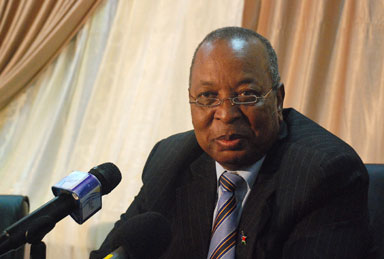South Sudan tightens visa policy after oil dispute with North
April 11, 2012 (ADDIS ABABA/JUBA) – South Sudan has tightened visa regulations for the many foreign nationals working in the nine-month-old country, as the oil dispute with north Sudan continues to have a negative affect on both economies.

Sources in Juba have told Sudan Tribune that the payments are a way for the government to make up some of the revenue lost after oil production was halted in January.
With oil making up 98% of South Sudan’s oil revenue Juba took the bold decision to stop production after Khartoum began confiscating oil that was traveling through Sudan for export, saying that it was for unpaid fees.
Since landlocked South Sudan seceded in July last year – taking with it 75% of the country’s oil production – the two sides have failed to agree a deal on oil transit fees and over the last two weeks have begun fighting over a key oil field that is disputed by both sides.
Reuters reported on Sunday that some petrol stations in Juba had run out of oil. Despite being an oil exporter South Sudan has no refinery and imports all of its oil at a premium from Kenya and Uganda, after Sudan shut the north-south border for trade after partition.
South Sudan’s minister of electricity and dams, David Deng Athorbei said last month that the imports from their East African neighbours have not been able to satisfy demand, especially as Kenya has its own fuel shortages.
“They can only sell a limited quantity of fuel because they are also facing fuel shortage. So this resulted to irregular supply of electricity of power in Juba and other town in South Sudan”, he said on 28 March.
South Sudan says it has enough reserves to hold out for a long time but a dollar shortage is driving up the cost of the many goods that the undeveloped nation needs to import.
INFLATION AND OIL SHORTAGES
Official data in March showed that inflation rose by 8.5% from to 50.9% on the previous month. Areas bordering Sudan, which closed the border for trade after partition have reported the worst affects of food and commodity increases as they have to be accessed by air, river or by the countries poor road network.
In late March Athorbei, accused neighbouring Sudan of cutting fuel supplies immediately after South Sudan became independent in July 2011. The new nation has to import fuel and many other essential goods despite exporting 350,000 barrels a day until the shut down.
The energy minister said that Juba faced possible power blackouts due to fuel shortages. Much of South Sudan’s electricity is produced through fuel-powered generators.
Last month Athorbei accused neighbouring Sudan of cutting fuel supplies immediately after South Sudan became independent in July 2011. The new nation has to import fuel and many other essential goods despite exporting 350,000 barrels a day until the shut down.
On Sunday South Sudan’s information minister denied to Reuters that the current oil shortage was due to a lack of dollars, saying that a new shipment was expected imminently.
EAST AFRICANS COMPLAIN OVER VISA FEES
Visa fees for foreign nationals were introduced after South Sudan seceded from Sudan. But Ethiopians and Ugandans in the South Sudanese capital have complained over the recent changes that mean they have to pay for the visa extension on a monthly rather than tri-monthly basis.
Ugandan expatriates in Juba have raised the matter with their embassy in Juba.
“We used to pay 150 pounds (approx. $37) for [a] three-month visa extension however we are now ordered to pay [the] same amount just for one month” Binyam Daniel, an Ethiopian hotel manager told Sudan Tribune.
According to the Ethiopian migrants, the latest visa polices came to effect after South Sudan shut down its oil production in January.
Following South Sudan’s independence in July 2011, the new country’s embassy in Addis Ababa says it is issuing 100 visas a day to Ethiopians travelers.
Upon entry to South Sudan immigrants are supposed to register at the foreign registration office, however, many of the newly arrivals refuse to do so and prefer to stay in illegal status to escape the monthly visa payments Sudan Tribune understands.
Seyoum Bahta an Ethiopian mechanic working in Juba and says the increased visa payments are an extra burden on top of the ever increasing living costs. He said his visa has expired two months ago as he refused to pay the new “unfair visa fees”.
Ethiopian immigrants who Sudan Tribune spoke to argued that the South Sudanese government needs to immediately reconsider the new regulations.
BORDER CONTROLS
Failure to renew the visa each month will mean that the aliens will become illegal immigrants and liable for arrest and deportation.
Every month, hundreds of Ethiopians cross from the western border region of Gambela into South Sudan seeking job opportunities.
Earlier this month the regions of Ethiopia and South Sudan that border each other held their first joint border commission meeting agreeing to control illegal migration. Check points will be established at Gambella and Akoba on Ethiopian side and Pagak and Nasir areas on South Sudanese side.
(ST)
